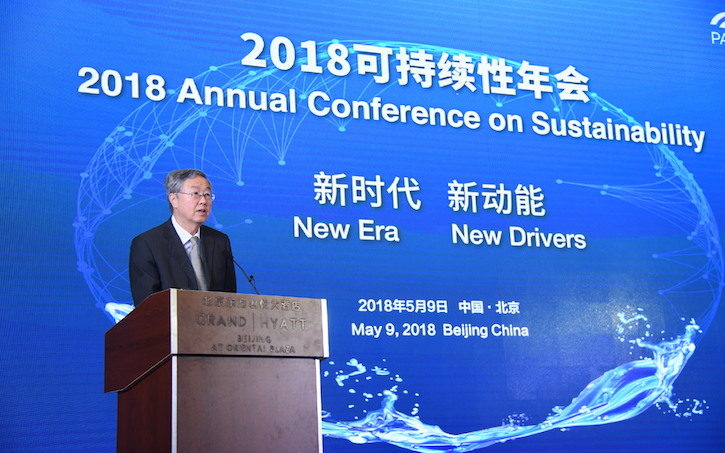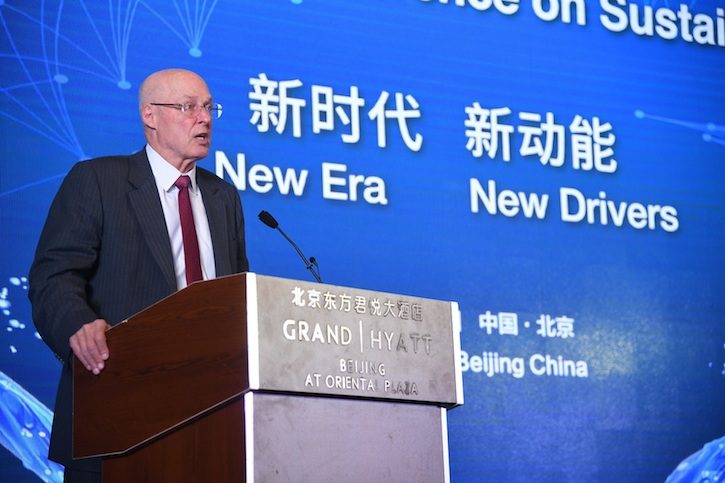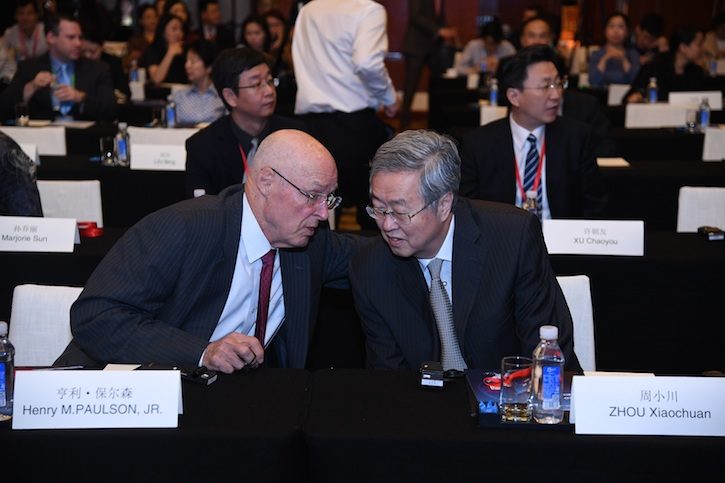
The Paulson Institute held its Annual Conference on Sustainability with the theme of “New Era, New Drivers” today in Beijing, in collaboration with the China Center for International Economic Exchanges (CCIEE). Government officials, business leaders, and industry experts from China and the United States convened to discuss the new drivers of economic growth, focusing on coordinating development across regions and between urban and rural areas. Discussion also centered on the opportunities and challenges that China faces in achieving its goals for coordinated and sustainable economic development.
Zhou Xiaochuan, Vice Chairman of Boao Forum for Asia and former governor of the People’s Bank of China, Henry M. Paulson, Jr., Chairman of the Paulson Institute, and Terry Branstad, US Ambassador to China, each delivered keynote speeches at the conference.

Henry M. Paulson, Jr., Chairman of the Paulson Institute, speaking on US-China relations and the Chinese economy:
- “Although our countries are experiencing a new stage of tension and uncertainty, I believe it is more important than ever to create a more balanced, more secure, and more productive US-China relationship. We can do this, in part, by creating more opportunities for the US and China to take joint or complementary action on global problems. This is what we do at the Paulson Institute.”
- “It’s the quality and sustainability of growth that are the defining features of the Chinese economy. The question, then, is how to marshal both private and public efforts to contribute to a Chinese economy that grows better, if not necessarily faster.”
Terry Branstad, US Ambassador to China, speaking on US-China relations:
- “The US and China are the two biggest economies in the world. American companies have rich experience in sustainability and creating solutions that are highly efficient and could reduce pollution. I believe that China’s current demand could be met and China’s sustainable development could be helped by US-Sino corporate collaboration and application of US technologies. Fair market entrance is a prerequisite if these technologies are to be applied in China.”
- “If we could develop some long-term solutions to the environmental issues, everyone is a winner.”

Zhou Xiaochuan, Vice Chairman of Boao Forum for Asia and former governor of the People’s Bank of China, speaking about building mechanisms for green finance and promoting green economic development:
- “In the new era, economic development cannot go the same way as before. Adhering to the concept that lucid waters and lush mountains are invaluable assets, insisting on sustainability to realize green economy and development and reduce the future costs will enhance the sustainability of economic growth. As China needs to invest 2 to 4 trillion yuan ($310 billion to $630 billion) annually in the next five years in order to counter the impact of pollution and climate change, the nation needs to come up with a green financing mechanism to facilitate its transition to sustainable growth.”
- Three highlight points about the development of green finance:
- “To advance green financing by leveraging the financial market, including further development of green credit, green bond and green ABS, supporting the qualified green companies IPO and re-financing activities, improving the market for environmental rights and interests, encouraging financial tools innovation such as those based on emission rights and energy use rights, and exploring green credit financing mechanism. However, we must strengthen risk management while improving the development of green finance.”
- “To improve incentive mechanism of green finance development, by consolidating the infrastructure and system development, promoting a unified standard system, improving the environmental information disclosure system including introducing the system for listed companies and bond issuers, and strengthening the third-party verification and bank green rating system. Meanwhile, the green industry fund should be established and tax credits should be increased, as well as other supporting measures including risk and credit grantee. The legal framework should also be reinforced regarding investment and financing activities and liabilities of legal person should be clarified.”
- “China should continue to strengthen international collaborations based on the current foundation to strengthen the cooperation in green standard, green rating, green information disclosure, promoting the experience sharing of green finance development and related ability construction, and accelerating the sound development of green finance.”



